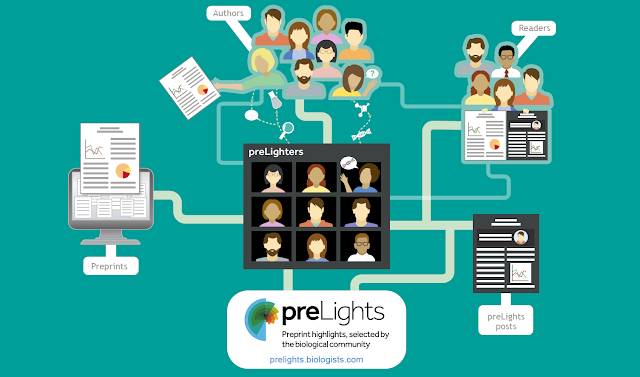In this post, we speak to Claire Moulton, Publisher at The Company of Biologists, and Mate Palfy, Community Manager for preLights.
Tell us a bit about your organisation.
The Company of Biologists is a not-for profit publishing organisation dedicated to supporting and inspiring the biological community. We publish five journals in the life sciences, we host workshops and meetings and provide a wide range of charitable grants. Community initiatives are important to us, for example we support a long-standing blog (the Node) for the developmental biology community, and our latest community project launched in February 2018 is preLights. preLights is just 18 months but has already gained significant name recognition in the biology community.What is the project/product that you submitted for the Awards?
We submitted preLights, which is a community platform for preprint highlights. An early-career team selects preprints of interest across the biological sciences, provides relevant comment, and engages authors in further discussion. The preprint highlight and comments are freely available on https://prelights.biologists.com/ .Tell us a little about preLights and the team behind it.
At the heart of preLights is a team of early-career researchers (called ‘preLighters’) who come from four continents and work in many different research fields. They select which preprints to feature and then highlight the key findings of the preprint. These highlights are somewhat similar to ‘news and views’ articles in that they give a background to the topic and summarize the results in the context of the literature. But preLights posts also have some unique features. For example, the preLighters give their personal opinion on the preprint and directly question preprint authors about their work. The resulting discussions are published at the end of the article – we know that authors find the discussion process useful, as some have provided feedback on resulting revisions to their preprints/ published articles.A dedicated community manager helps build the community of early-career researchers around preLights, provides them with support, and is involved in evolving and promoting this initiative.
In what ways do you think it demonstrates innovation?
So far there has been very little public commenting happening on preprints, even though preprints could open up discussion of non-peer-reviewed research. preLights promotes such discussions by getting young scientists to write about the work and engaging preprint authors. Therefore, as the first platform of its kind, we believe preLights will change the way in which scientists engage with preprints.preLights is also innovative in that it builds on a community of early-career researchers, who are often not asked directly by journals to take part in peer-review. preLights gives them an opportunity to hone their scientific writing skills, helps build their profile and credibility, and at the same time harnesses ideas from them for extending the product.
What are your plans for the future?
We have just launched a new feature on the preLights website called preLists in order to further help scientists navigate the preprint literature. These curated lists of preprints follow two main themes: preprints on a specific topic (e.g. CRISPR technology) or preprints which have been presented at a given scientific meeting. Following feedback from the community, we are now planning to make the creation of preLists open to any scientist.We plan to expand preLights posts into new areas; for example now that medRxiv has launched we expect to have more team members covering biomedical fields.
We also plan to utilize preLights as a platform to provide educational insights into the peer-review process. The posts automatically link to the published version of the article, and we are planning to engage preprint authors to comment on the most important parts of their paper that changed during the peer-review process. We believe this can serve as a useful teaching resource for young scientists and help open up the ‘black box’ of peer-review.
Websites:
https://prelights.biologists.com/
https://prelights.biologists.com/prelists/
Twitter handles:
@preLights
@Co_Biologists
The ALPSP Awards for Innovation in Publishing 2019 are sponsored by MPS Ltd.



No comments:
Post a Comment